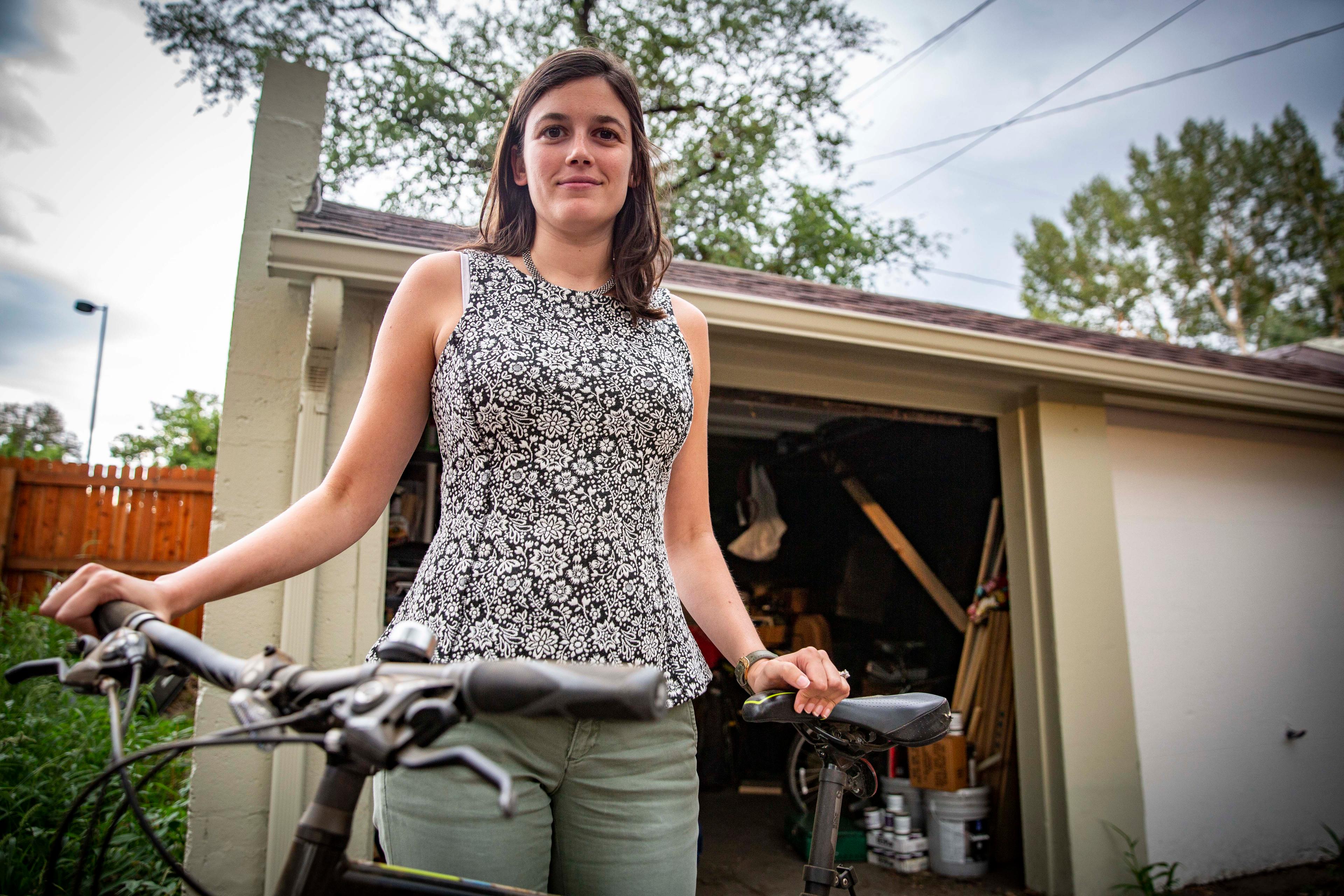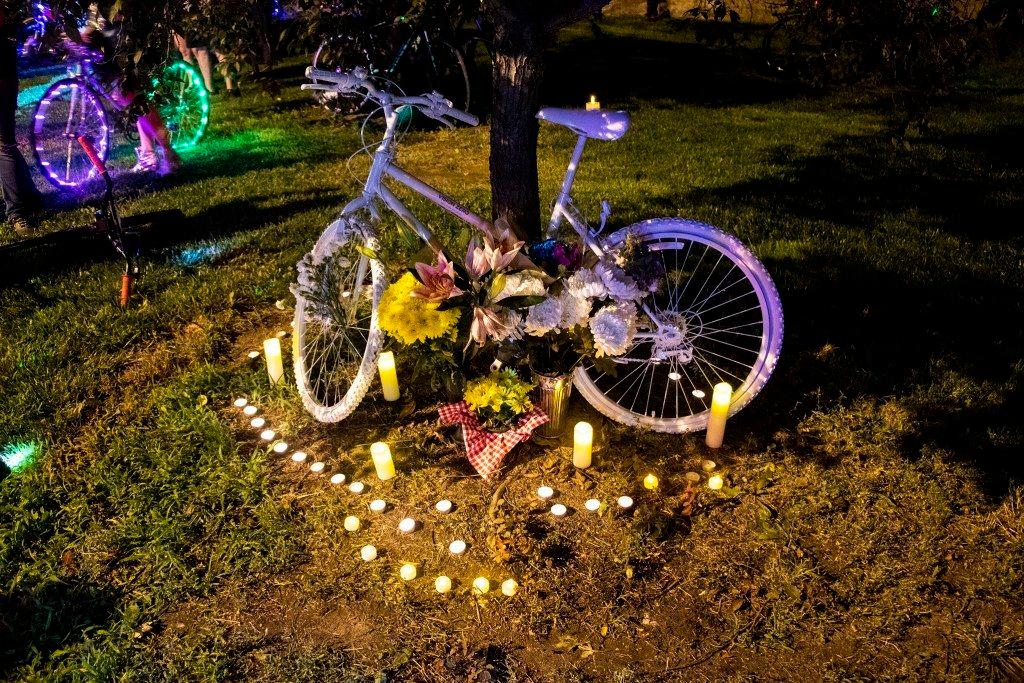
On a sunny morning in May 2016, Ali Clerkin strapped on her helmet and pedaled up the South Marion Street Parkway in Denver. She had used the popular bikeway near Washington Park to reach the Cherry Creek Trail and her job downtown since 2013, when she moved to the city.
As she reached East Bayaud Avenue, where the unprotected bike lane veers West to meet South Downing Street, and where another cyclist was killed just last week, her bike and a truck collided.
“I remember every second of it, every millisecond of it,” Clerkin said from her living room this week. “I remember feeling him hit me from my left side, feeling my head hit the top of his car, feeling my shoulder hit the side view mirror of his, and, um, then I remember feeling my body hit the ground.”
The driver and others nearby stopped to help. The police report contains conflicting statements from Clerkin and the driver, but Clerkin said the driver’s insurance company accepted 100 percent fault. The driver didn’t immediately respond to a request for comment.
She remembers people covering her with clothing because she was going into shock. She remembers the pain. And she remembers being conscious enough to ask a bystander to call her husband, Jason.
“He just got this call from a stranger that said, ‘Your wife's been hit by a car. You better come to her quickly.’ And all he could see was ambulances and fire trucks turning down the road and he didn't know what he was walking up on,” she said.
Clerkin and her husband went to the hospital, where doctors told them what had happened. Her shoulder was dislocated. Her upper left arm, elbow and hand were all broken. She needed surgery.
“I remember later having a conversation with the doctor and saying, ‘OK, so you know, can you just put my arm back in its place and, I'll go back to work tomorrow?’ And he was like, ‘No, you're not going back to work for a while.’”

The recovery was worse than the actual collision, Clerkin said.
The pain and discomfort were constant for the first few months, and she needed to get used to being limited in what she could physically do. Emotionally, she had to process what happened — at different points she felt sadness, then confusion, then anger.
But slowly, she got better.
Clerkin and her husband Jason were newly married, and he became her caretaker.
“I was pretty thankful,” she said. “But also, it was hard on us.”
After more than two months at home, Clerkin felt well enough to return to work. And one day, as she was driving home, she felt an urge to get back on her bike.
“And it was a perfect night because it was a night that I was alone and I could just do it for myself. There was no fanfare around it,” she said.
She rode around Washington Park. When she told her husband about her ride later, he reminded that it was two years, to the day, after the collision.
“And I didn't even consciously put that together of like, this is the second-year anniversary of me getting into an accident and here I'm doing this,” she said.
A woman was killed at nearly the same spot on South Marion Street last week.
Alexis Bounds, 37, was struck and killed by a dump truck taking a right turn last week. Clerkin didn’t know her, but she’s taking her death personally.
“I don't have words. I feel it in my heart. I feel it in my stomach,” Clerkin said. “I can't compare my story to hers at all. I just know that, to me, it wasn't another sad story of a death. It was something that was like, ‘Wow, I know exactly where that was. I know exactly how it feels to be hit by a car.’ Not to that extent, of course, but it felt like so much deeper.”
The South Marion Street Parkway connects Washington Park to the Cherry Creek Trail. It can seem like a tranquil street, said Piep van Heuven, policy director at Bicycle Colorado, but in reality, it’s one of the highest-traffic bike routes in the city.
“It’s a bit of an illusion,” van Heuven said.
Where crossings on busy arterial roads like Federal Boulevard or MLK Bouelvard are the most dangerous for pedestrians, van Heuven said cyclists can be most at risk on residential streets where they aren’t as visible.
“For example, if car parking extends all the way to the end of the intersection, it can be hard for the driver or the bicyclist to see around the corner,” she said.
Bounds’ death, and the deaths of three other cyclists across the Front Range last month have set off a week of memorials and protests. On Friday night, cyclists plan to take over downtown Denver streets in a Critical Mass ride.
Many advocates are calling for more bike infrastructure, which research suggests keeps both drivers and cyclists safer. But changing street design is a slow, controversial process. The city of Colorado Springs has re-purposed some traffic lanes as bike lanes on major roads in recent years, causing a community uproar.
In Denver, the city is slowly working toward having a total of about 325 miles of bike lanes by the summer of 2023. Meanwhile, residents near the South Marion Street Parkway have objected to the city’s plan of adding protection to the bike lanes there next year.
Clerkin agrees that more protected lanes and better intersections would people safer.
But she said she won’t be using them anytime soon; after her ride through Washington Park, Clerkin put her bike in the garage, where it still sits under a fine layer of dust. She proved to herself she could ride it again, but she just doesn’t enjoy it anymore.
“To me, it feels like there's this invisible block around my bike,” she said.
“I can't, I can't get to it. I can't go. I can't, I can't do it. It's too hard for me to get to my bike.”









